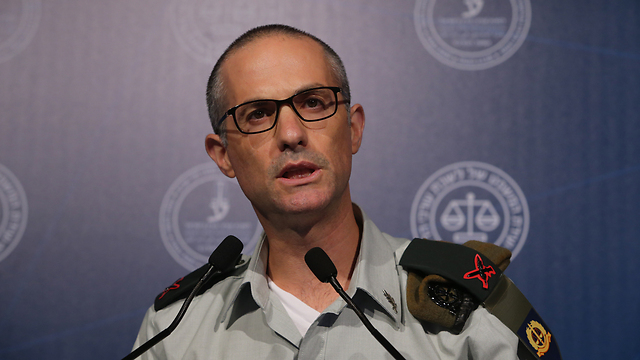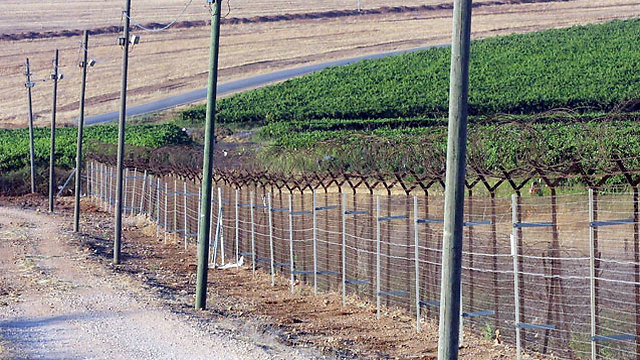
The officer in court
Photo: Avi Moalem

2 soldiers on trial for shooting Palestinian teen to death 5 years ago
Armored Corps reservists face criminal charges in civil court following 2013 shooting and death of Palestinian teen suspected of damaging West Bank separation fence; 'We're not robots,' officer involved testified; soldiers' former battalion commander: 'You don't tell your soldier, "Take your weapon, go out in the field and don't open fire." Otherwise we might as well be sending them out there with broom handles.'
Two young men in their mid-twenties have been on trial for more than a year in the Ramla Magistrates' Court for their alleged involvement five years ago in the death of a Palestinian teen they suspected to be a terrorist.

The two—whose names were not released—have been indicted for "a reckless act and negligence," despite the fact that more serious charges were considered earlier in the investigation. The pair, soldiers at the time of the incident, claimed they first shot in the air and later aimed at the Palestinian teen's feet.
The incident took place in early 2013, when a force from the 71st Armored Battalion, tasked with overseeing a sector near Ramallah, ambushed Palestinians suspected of damaging the separation fence near the village of Budrus.
The operation turned complicated, however, when teens began throwing rocks at the soldiers' location near 7am. The force nevertheless lied in wait for the first Palestinian to be found between the two fences and when one arrived, soldiers initiated a suspect arrest protocol that included at least five shots being fired by two of the soldiers—one of them a platoon commander.
Attorneys for two from the Office of the Chief Military Defense alleged selective enforcement during their trial, as data obtained by the IDF showed that 112 Criminal Investigation Division (CID) inquiries were opened in the past seven years regarding IDF soldiers' involvement in the deaths of Palestinians during operations, but only three other cases concluded with an indictment.
The attorneys demanded that Chief Military Advocate General Brig.-Gen. Sharon Afek should also be called in to provide testimony, but the judge has yet to render her decision on the request.

Chief Military Advocate General Brig.-Gen. Afek may be called in to testify on possible selective enforcement (Photo: Zvika Tishler)
The first defendant—at the time a junior officer and the force's commander—began testifying Tuesday. After the incident, he was promoted to a more senior role in the battalion and commanded a tank company that fought in Gaza's Shuja'iyya neighborhood during Operation Protective Edge.
When he was released from his mandatory army service, he left for a post-army trip abroad, and was surprised to learn of the indictment upon his return. He currently resides in the south and is studying for a bachelor's degree.
"It was the first time I carried out a suspect arrest protocol that included shooting and more than shouts of 'halt' in Arabic," he said in his testimony. "I planned the mission out together with the company commander after many instances in the sector of Palestinians damaging or defacing the fence.
"Palestinians teens arrived at 7am and began throwing rocks at the fence. Two of the soldiers in the force were hit, but we didn't go out to them because we didn't want to blow our cover. The mission was to apprehend the perpetrators rather than scare them away.
"At some point, one of them passed the fence. The ambush was sprung and the perpetrator ran towards the spot where I was lying in wait. The ambush was not sprung as I planned (throwing stun grenades—ed) so when the perpetrator ran towards me, I cocked me weapon and shot at a 60 degree angle.
"He did a virtuoso jump, rolled and fell into a concertina wire fence. We trained our weapons on him. Seconds later, he extricated himself from the concertina wire and took off running towards another wire fence. I then shot again, this time three times. The first (shot) was aimed at the side of the perpetrator's leg and the remaining two towards his lower limbs—from the knees down.
"After my shots, another soldier shot once or twice in the air and asked me whether to throw a stun grenade as well. I then saw the perpetrator was down. I ran towards him and saw he was bleeding from the face and chest. I tried providing medical attention. The village erupted into chaos. I didn't prevent the terrorist's brother from taking him back into the village."
The defendant claimed in court his actions were immaculate, saying, "I violated no protocol and obeyed all standing IDF orders. I clearly communicated to soldiers the conditions of opening fire and made sure they understood them.
"The ability to think clearly in the midst of an incident like that is not really identical to your ability before the incident, so soldiers learn to follow procedures. We're not robots.
"I do agree that once he turned his back and took off running towards the Palestinian area, he was less of a threat to the force. I didn't shoot him in the back. My judgment is not what I feel or think but what IDF orders say and categorize that teen—as someone present between the two fences and suspected of committing a dangerous crime."
The second defendant is expected to provide the court with his own account at a later date, and the two have thus far enjoyed the complete backing of their former commanders, who have already testified.
The battalion's then-commander, Col. Nir Rosenberg, provided decisive testimony in which he told the judge, "Soldiers are permitted to open fire in cases of action and reaction necessitating a suspect arrest protocol, even if the end result is someone unfortunately dying. We expect that of them.
"I never tell my soldiers, 'You have a weapon but don't use it.' That isn't a message that can be part of military discourse. If we have no confidence in our methods, or we can't trust our soldiers' judgment, then we had best abort the mission altogether. In this instance, it was soldiers I trust one hundred percent."
Col. Rosenberg admitted that faults were found in the mission's case file. "I think there are operational situations in the field, such as this one, which are complex and are related to the tactical world of exercising violent force to carry out a military mission. We aren't doing PR.
"We, as commanders who send our soldiers to carry out missions, take into account such complications, but don't expect them to face criminal charges. I hope the lesser count of reckless use of weapons will lead to as lenient a punishment as possible if they are convicted—which I hope they aren't.
"As their commander, I think there's a cynical attrition and use of soldiers we sent into battle. Professionally, this was a complex situation that didn't end well, but was within the rules of engagement. The situation isn't so complex."
Later in his testimony, the senior officer reiterated the difficulties soldiers face in similar incidents. "I have enough experience under fire (to know) that once an operational situation such as this occurs, adrenaline plays a considerable role in the ability to reach coherent decisions, and then your professional level carries immense weight.
"You don't tell your soldier, 'Take your weapon, go out in the field and don't open fire.' Otherwise we might as well be sending them out there with broom handles."
Having said the above, Col. Rosenberg went on to illustrate how complex the situation in the West Bank was and also criticized the force's conduct, saying, "When we prepared the ambush we realized we were dealing with a young populace and in general, there's no intention to reach situations involving killings in the West Bank.
"I expect the force in the field to arrest (suspects) because they are teenagers, not terrorists. That is, we're going in to apprehend people operating in a closed military zone and are suspected of a dangerous crime. We're not looking at a terrorist enemy in the abstract sense of the word, but boys severely damaging the fence. They therefore needed to have—or would have been more correct—to stop at shooting in the air.
"The force did not act as expected of it in relation to the operational goal set or binding protocol and procedures, regarding rules of engagement, for instance. There were several dozen bullet casings in the field, and we came to the conclusion the shooting was carried out by two or three soldiers at different points in time.
"The amount of fire was exaggerated, which in my opinion attests to an action that was not sufficiently professional."


















